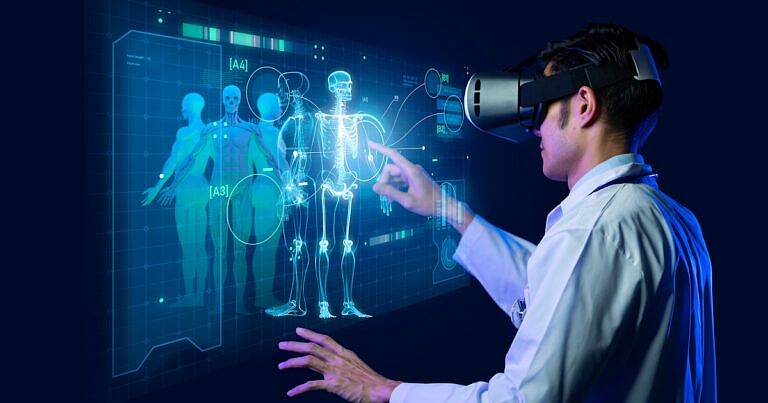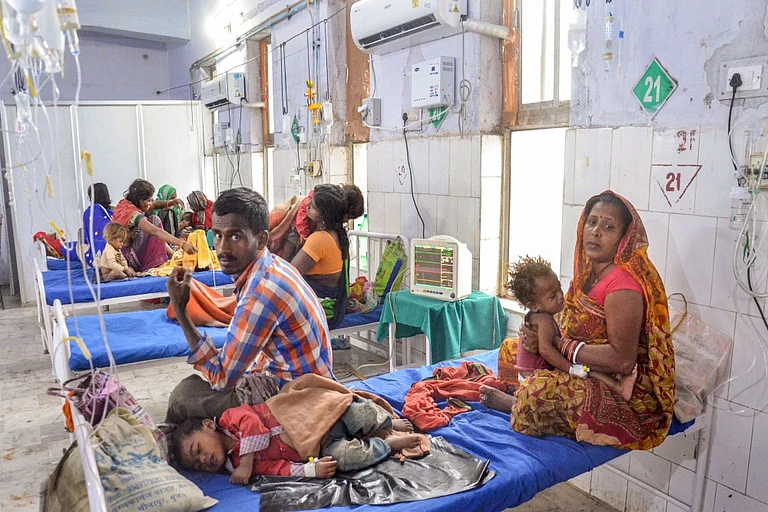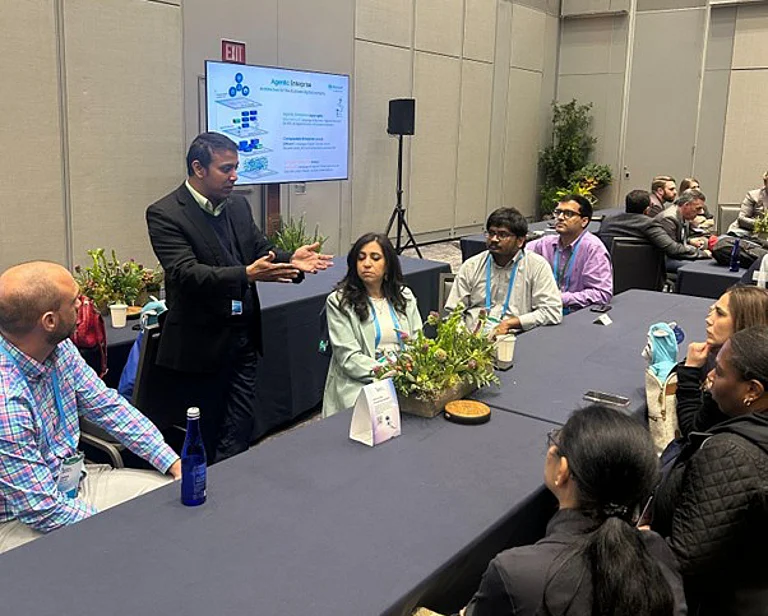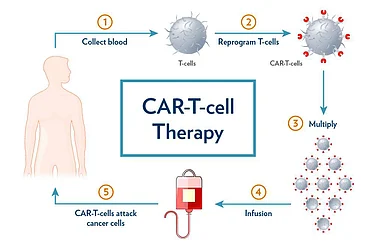India is a global leader in healthcare. The country has a long history of medical innovation and has some of the greatest hospitals in the world. With the enhancement of cutting-edge technology, Indian hospital networks are gradually adopting artificial intelligence (AI). Artificial intelligence improves the lives of patients, doctors, and hospital managers by executing jobs that humans would normally accomplish in less time and at a lower cost. In recent years, the integration of AI into the Indian healthcare system has gained remarkable momentum. With India facing unique healthcare challenges, from a high patient-to-doctor ratio to limited resources in rural areas, AI's potential to address these gaps is being recognised and actively pursued. Here’s a look at how AI is transforming healthcare in Indian hospitals, its applications, and the road ahead.
AI In Healthcare

India, as a country, welcomes a significant number of inbound visitors seeking a variety of healthcare services. In recent years, India has developed as a key centre for medical tourism. With the tremendous growth of India's healthcare sector, there is an increasing desire for new solutions that can improve patient care while lowering costs. AI in healthcare is one of the solutions that is growing in popularity in India. Leading Indian hospitals have already implemented AI-powered diagnosis, treatments, and procedures. Apollo Hospitals, for example, uses artificial intelligence to diagnose heart problems and strokes. Similarly, Fortis Healthcare uses AI to identify cancerous tumors.
AI in healthcare is the application of machine learning, natural language processing, deep learning, and other AI technologies to improve the experiences of both healthcare workers and patients. AI's data-processing and prediction skills allow health practitioners to better manage their resources and tackle many facets of healthcare more proactively.
India's healthcare system is one of the world's largest and most complicated, serving a population of more than 1.4 billion. India faces a myriad of healthcare issues, including limited healthcare infrastructure, a shortage of competent healthcare personnel, and an increasing load of diseases. The introduction of AI technologies gives a glimpse of hope and has emerged as a viable answer, providing opportunities to improve diagnosis accuracy, optimize operations, and customize patient care. From predictive analysis to robotic-assisted surgery, AI applications in healthcare are poised to transform traditional ways of diagnosis, treatment, and patient management in Indian hospitals.
Applications of AI in Indian hospitals
AI is transforming predictive diagnostics, customized treatment and drug development, dramatically increasing patient care and operational efficiency in Indian hospitals in healthcare. For example, Saathealth, an app that provides health and nutritional education, seeks to improve the general well-being of young children in India's impoverished neighbourhoods.
Revolutionizing diagnostics
AI technologies are increasingly deployed to aid in diagnostics, where it can efficiently analyze medical images, CT scans, and X-rays. AI is modifying medical diagnostics with unprecedented accuracy and speed. In radiology, AI systems can detect subtle anomalies in medical images that the human eye may miss. For example, a 2020 nature study found that AI systems reduced false-positive and false-negative detection rates of biopsy-confirmed breast cancer by 1.2% and 2.7%, respectively. As AI evolves, it promises to improve diagnostic accuracy in a variety of medical domains, including ophthalmology (study of eye) and pathology (study of disease).
Predictive analytics for disease prevention
AI’s ability to analyze vast datasets can predict disease outbreaks and track their spread. For instance, data-driven AI models have been used to track diseases like tuberculosis and dengue in real-time. Predictive analytics helps in early identification of at-risk patients, allowing preventive measures to be implemented before diseases become widespread.
Telemedicine and virtual health assistant
AI plays a crucial role in extending the scope of healthcare through remote monitoring and telemedicine systems. In India, where remote and rural regions often lack access to basic healthcare facilities, telemedicine powered by AI-based chatbots and virtual assistants has bridged the gap. Platforms like Practo and Mfine have used AI to enable virtual consultations, where AI-powered algorithms assist doctors in understanding patient queries, and symptoms, and providing primary diagnosis. WHO's Sarah is a digital health promoter prototype that is available 24 hours a day, seven days a week in eight languages via video or text.
Robotic Surgery and AI
AI and robots have become an integral part of any hospital that helps with everything from less invasive treatments to open heart surgery. Surgeons can control a robot's mechanical arms from a computer interface while the robot displays a three-dimensional, enlarged picture of the surgical site. The surgeon then directs the other team members, who collaborate closely with the robot throughout the operation. Robot-assisted operations have resulted in fewer surgery-related problems, reduced discomfort, and faster recovery times. Robotic surgery systems like the Da Vinci Surgical System and other advancements have made complex procedures more accessible to patients, although currently limited to larger, well-funded hospitals. All major healthcare providers, including Apollo Hospital, Manipal Healthcare, and Astar DM Healthcare, use artificial intelligence for prediction, prevention, diagnosis, and tailored management.
Drug Discovery and Development
AI is significantly speeding up the drug research and development process, potentially bringing life-saving treatments to market sooner and at a cheaper cost. Machine learning algorithms can assess biological data, anticipate drug-target interactions, and optimize chemical structures, resulting in significant time and resource savings for early-stage drug discovery. In 2020, Insilico Medicine used AI to design, synthesize, and validate a novel medication candidate for fibrosis in 46 days, a procedure that would normally take years.
Advantages of AI in Healthcare

Improving accuracy and speed in diagnosis: AI enhances diagnostic precision by quickly analyzing and interpreting vast datasets, minimizing human error. This is crucial for diagnosing diseases like cancer at an early stage, where timely intervention can make a significant difference. AI helps in improving patient outcomes and helps patients by offering decision support and personalized therapy recommendations.
Cost efficiency: By automating routine tasks and optimizing resource utilization, AI reduces healthcare costs in the long run, making it more affordable for patients of India. Hospitals can manage resources more efficiently, potentially lowering the cost of healthcare delivery.
Improving access to care: Artificial intelligence can help enhance access to treatment by offering decision support and guidance to both patients and professionals.
Empowering patients: AI may empower patients by providing them with access to their health data, allowing them to make educated decisions about their care.
Reduction in human error: AI models, trained with vast amounts of medical data, assist doctors in making informed decisions with minimized error rates. This improvement in diagnostic accuracy directly impacts patient outcomes and reduces misdiagnoses.
According to PwC, India experienced the greatest increase in the application of AI during the epidemic. 73% of the healthcare and pharmaceutical industries in India have adopted artificial intelligence. Furthermore, 71% of Australian and New Zealand doctors believed that artificial intelligence had a positive impact on medical practice. As a result, by integrating AI technologies, medical tourism providers can enhance patient experiences, streamline operations, and ensure optimal treatment outcomes.
Government’s Initiatives
India is witnessing a significant surge in AI-driven healthcare. According to the latest figures, the Indian healthcare AI industry is estimated to reach USD 1.6 billion by 2025, growing at a CAGR of 40.5% from 2020 to 2025. Since 2018, the NITI Aayog has collaborated with Microsoft and Forus Health to develop AI for the early identification of diabetic retinopathy. The development AI system could be utilised as a screening tool in basic care. Similarly, India's first de-identified cancer image bank, the Comprehensive Archive of Imaging (CHAVI), developed by the Tata Medical Centre and IIT Kharagpur, enables AI tools to use oncological images, empowering ML models to identify biomarkers and improve cancer research outcomes.
AI has the potential to reshape Indian healthcare by making quality care accessible, affordable, and efficient. While the journey is not without challenges, its promises of improved diagnosis, personalized care, operational efficiency, and cost savings make it an essential investment for the future of healthcare in India. The application of AI in Indian healthcare is quickly increasing, and the opportunities for its implementation are numerous. With AI in place to automate boring operations, streamline data administration and analysis, and enable more accurate diagnosis, there is no doubt that it will alter the way healthcare services are delivered in India. While some may be concerned about the entrance of such technology into their life, it is apparent that AI will play a significant role in determining the future of healthcare delivery not only here, but all around the world.



























